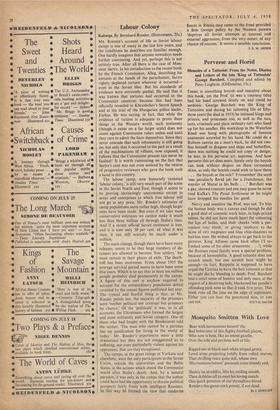Labour Colony
Katorga. By Bernhard Roeder. (Heinemann, 21s.)
MR. ROEDER'S account of life in Soviet labour camps is one of many in the last few years, and the conditions he describes are familiar enough. One hardly imagines that anyone nowadays needs further convincing. And yet, perhaps this is not entirely true. After all there is the case of Mon- sieur Sartre. In his introduction to the recent book by the French Communist, Alleg, describing his tortures at the hands of the parachutists, Sartre rightly deplored torture wherever it occurred— even in the Soviet bloc. But his standards of evidence were extremely partial. He said that it was known that tortures had occurred in the Communist countries because this had been officially revealed in Khrushchev's Secret Speech and at the trial of the Hungarian police leader, Farkas. He was saying, in fact, that while the evidence of victims is adequate to prove these things in the Western world, such testimony (though it exists on a far larger scale) does not count against Communist rulers unless and until they care to admit the facts themselves. Since they never concede that such inhumanity is still going on, but only that it occurred in the past as a result of the machinations of villains, now exposed, it follows that the Communist present can never be faulted! It is worth ruminating on the fact that Sartre's cant was not even noticed by the swarm of progressive reviewers who gave the book such a hand in this country.
The labour camp, now humanely renamed 'labour colony,' is still very much part of the scene in the Soviet North and East, though it seems to be proving increasingly uneconomic except in areas and enterprises to which free labour will not go at any price. Mr. Roeder's estimates of camp populations seem rather high, though larger ones have been made. But even if we take most conservative estimates we cannot make it much less than three million all through Stalin's time. And if a recent official Soviet statement is true, and it is now only 30 per cent. of what it was then, it can still scarcely be much under a million.
The main change, though there have been many releases, seems to be that large numbers of de- tainees are allowed to become 'free settlers,' but must remain in their places of exile. The death- roll has been enormous. From about 1935 the average survival period seems to have been some five years. Which is to say that at least ten million people probably died prematurely in the camps. A figure of this sort is anyhow required to account for the extraordinary population deficit revealed by the census figures published last year. The typical and fearful thing is that, as Mr. Roeder points out, the majority of the prisoners were 'neither political nor criminal but prisoners by chance.' Of the 'politicals' it was, as in all accounts, the Ukrainians who formed the largest and most militantly anti-Soviet category. One of them who had fought with the Benderovsti told the author, 'The man who cannot be a partisan has no justification for living in the world of today.' Mr. Roeder's experiences seem a little dramatised but they are not exaggerated as to suffering, nor even particularly violent against his oppressors. Nor are they exceptional.
The camps, in the great risings at Vorkuta and elsewhere, were the only participants in the Soviet Union, outside the universities and the Baltic States, in the actions which shook the Communist world after Stalin's death. And, by a natural paradox, it was only in the camps that the author could have had the opportunity to discuss political prospects fairly freely with intelligent Russians. In this way he formed the view that moderate
forces in Rtissia may come to the front provided a firm foreign policy by the Western powers 'deprives all Soviet attempts at internal and external aggression, from the very outset, of any chance of .success.' It seems a sensible conclusion.
J. E. M. ARDEN






















































 Previous page
Previous page